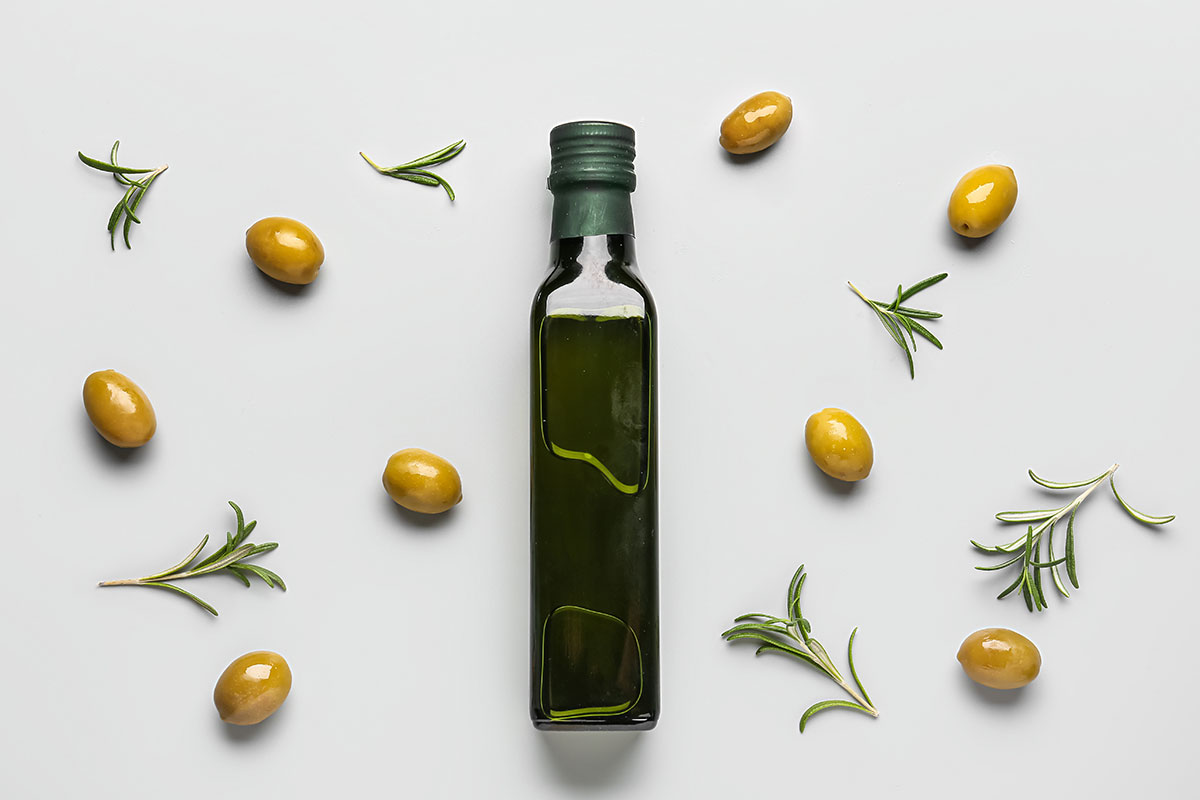Get a Free box of Gummies ($120 value) when you spend $200 or more. Now through Monday

There are numerous cooking oils on the market, each boasting a variety of benefits, making it difficult for consumers to decide which one is best to use. The fact that they are plant-based may instantly imply that they are beneficial for us. However, not all cooking oils are nutritionally equal.
In this blog, we take a look at the potential health benefits of extra virgin olive oil and why it should be a component of your everyday meal plan.
For thousands of years people from the Mediterranean Sea region, which includes Greece, Italy France, and other neighboring countries have shared a cuisine rich in plant-based foods and extra virgin olive oil (EVOO). Their diets consisted primarily of fruits, vegetables, and starches such as bread, potatoes and various cereals, lentils, beans nuts and seeds.
Dairy, fish and seafood, as well as chicken were consumed in moderation, while processed foods and red meats were rarely included in their diet. Salt was not a staple on their tables, but rather they used fresh herbs for seasoning. They also enjoyed fermented beverages like wine with their meals, which they consumed in moderation.1,2 Extra virgin olive oil, the preferred dietary fat consumed, may contribute to the populations’ overall general health.
Over the years, there has been a growing interest in the areas’ particular dietary customs and active lifestyles, with the goal of gaining an understanding of how these dynamics contribute to their health and well-being.
Let’s take a look at understanding the differences among the various olive oils and what deems them refined, virgin or extra virgin olive oil.
Whether you dip some homemade bread into some naturally seasoned olive oil or drizzle it on some freshly roasted vegetables, you are making a wise decision to use a dietary fat that promises a nutritional profile that is superior to that of saturated fats in your diet like butter, margarine or other saturated fats.
But how can you decipher the differences among these olive oils? Well, one of the main differences among these oils is the way that olive oil is processed.
Extra virgin olive oil is one of the most widely used oils in dishes around the world. It’s golden green color boasts of the most flavorful of all the olive oils. Extra virgin olive oil is still preserved closest to nature when made, starting out with cleaning the olives with water and mechanically pressing or crushing the olives with a mill. It is considered unrefined. The oil from the olive fruit is extracted without the use of chemical solvents or high temperatures.3
Did you know that there are international standards to be met for olive oil to be called extra virgin? Though here in the United States, testing isn’t required, the California Olive Oil Company (COOC) instituted a program called the Seal Certification Program that ensures their EVOO meets standards.3
Also, if you are looking to ensure a top notch EVOO, then choosing one that is organic is a sure win! Additionally, be cautious to avoid blends made with seed or vegetable oils, as they can reduce the purity and nutritional benefits of true extra virgin olive oil.
Virgin olive oil (VOO) is processed similarly to extra virgin olive oil. There are no heat or chemicals used and the olives are simply mechanically pressed to yield pure olive oil. It is also rich in antioxidants and phytochemicals and vitamins E and K just like EVOO. However, one of the main differences is that the flavor of virgin olive oil has some notes of irregularity and is best used for baking, roasting, and in marinades where the flavor profile can be masked.4
Olive oil is a combination of refined olive oil and approximately 15 to 25% virgin olive oil. Because it is refined, it has been processed with some heat and chemicals. Refined olive oil may decrease the amount of antioxidant and polyphenols secondary to the refined processing, unlike EVOO or VOO.4
Olives are naturally abundant in antioxidants and other phytonutrients like polyphenols. Based on the processing, these nutritional components can be diminished secondary to heat and chemical processes when producing olive oil. Extra virgin olive oil, on the other hand, is thought to be a better choice nutritionally than regular olive oil because it is not processed at high temperatures or with chemicals, and therefore contain more of these naturally occurring beneficial plant compounds, such as polyphenols and antioxidants.5
A diet high in antioxidants helps to maintain a positive balance of support for fighting free radicals, which may halt the progression and cellular damage of oxidative stress.
Extra virgin olive oil is rich in monounsaturated fatty acids (MUFA), including oleic acid and antioxidants, which are known to be cardio protective. Compared to other plant-based dietary oils, olive oil contains the most monounsaturated fats. This monounsaturated fat may help to support healthy lipid management, by helping to lower “bad” LDL cholesterol while increasing “good” HDL cholesterol.6
According to the American Heart Association, studies have shown that olive oil may lower blood pressure because it contains phytonutrients that are naturally anti-inflammatory and rich in antioxidants.7
Monounsaturated fats, like all fats, should be consumed in moderation because they are still calorically dense. Most studies support consuming about one-half of a tablespoon daily, but everyone’s caloric and nutritional needs vary. An overall healthy diet that promotes plant-based foods and variety, like the Mediterranean diet, is key, not just one component.6,7
A healthy lifestyle that includes stress management, regular physical activity and adopting a diet that is plant-based and nutrient rich, like the Mediterranean diet may help to support one’s overall health. Additionally the incorporation of extra virgin olive oil to this diet lends to health benefits and may help to support healthy glucose and lipid metabolism, and increase insulin receptivity.8
The use of EVOO and the Mediterranean diet may also contribute to the reduction in weight and a decrease in visceral obesity due to a decrease in inflammation and oxidative stress.8
Extra virgin olive oil’s health benefits, as well as the Mediterranean diet, are still being studied. The overall goal is to encourage people to engage in more physical activity and live a lifestyle that promotes a daily diet rich in fruits, vegetables, whole grains, fish, and other low-fat dairy products, similar to the Mediterranean diet. Adding extra virgin olive oil, which contains heart-healthy monounsaturated fatty acids, can help to increase antioxidants in the daily diet, resulting in a cascade of positive health benefits.
These statements have not been evaluated by the Food and Drug Administration. These products are not intended to diagnose, treat, cure, mitigate, or prevent any disease. Individual results may vary. The information provided in this blog is for educational and informational purposes only and should not be construed as medical advice.

Ken Swartz, MS is the co-founder, Chairman Emeritus, and former Chief Science Officer at C60 Power, a health and wellness company committed to delivering the highest quality Carbon 60 products available. Ken earned a Master of Science degree from the University of Colorado at Denver and a Bachelor of Science in Economics from Arizona State University.’
References
3.“Olive Oil Information for Consumers.�? Aboutoliveoil.org, 2024, www.aboutoliveoil.org/consumer-info. Accessed 26 Aug. 2024.